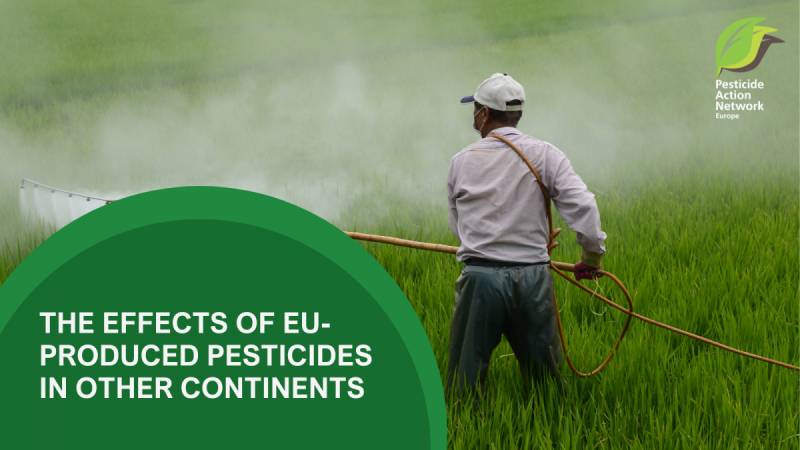"Every time the planes pass by, your eyes start burning and your arms itch. The smell is terrible, you often feel nauseous. They say that these chemicals are used to export fruit but they shower us with pesticides every morning and evening," declared Lidieth Gomez from Costa Rica. Highly toxic pesticides banned in the EU are still exported to third countries. What exactly are the effects of EU-produced pesticides in other countries? PAN Europe and many partners have been campaigning to end the export of banned pesticides. A selection of investigations supported by Journalismfund Europe shows us a clear picture. Highlighting the terrible effects caused by pesticide use in Costa Rica, Indonesia, Kenya and Cameroon.
Costa Rica is the third biggest banana and pineapple producer. This world title comes with a heavy price for its inhabitants and environment. Highly toxic pesticides, forbidden in the European Union, such as Mancozeb, Chlorpyrifos, Chlorothalonil, Ethoprofos and Diquat are constantly air-sprayed over farmer workers and their families. Often the origin of the pesticides is not clear, but in some cases they come from EU exports.
The spraying can cause alterations in thyroid hormones, potentially damaging the nervous system and fetal development. "I know that these chemicals are not good for you. Every time the planes pass by, your eyes start burning and your arms itch. The smell is terrible, you often feel nauseous," declared Lidieth Gomez, a participant in the investigation in Costa Rica.
Aerial spraying not only damages people’s health and rights, it is also disastrous for the environment. Costa Rica is known for having one of the highest biodiversity densities in the world – about 6% of species are concentrated here – but the country is also sixth in pesticide use, with a consumption of 17.6 kilograms per hectare, according to FAO data. Another 2022 study by UNDP, indicates a consumption of 34.45 kilograms per hectare.
Indonesia: Paraquat in palm oil plantations
In Indonesia, the pesticide Paraquat is massively used in palm oil plantations. This problematic pesticide is forbidden in most countries due to its high toxicity. However, it is still sold by Syngenta (formerly a Swiss company, now Chinese-owned).
“In Seruyan, Central Kalimantan, paraquat is affecting not only the health of the workers - mostly women hired as daily labourers to spray the pesticide - but also the community’s livelihood, polluting the water and disrupting the ecosystem. With the Indonesian government trying to silence dissent on such a key sector, and the EU refusing to take actions on banned pesticide exports, local communities' health and future are at stake - as the long-term consequences of pesticides might hamper any attempt to switch to more sustainable cultivation,” says the investigation.
“The fact that these substances are produced and imported from countries where they are banned due to their danger constitutes an unacceptable double standard,” declared Sarojeni Rengam, director of the Pesticide Action Network Asia Pacific (PANAP).
Series of interesting articles
Below you find the links to a series of articles by Journalismfund Europe. They show the horrible effects caused by the use of highly toxic pesticides banned in Europe. The articles describe the unprotected use of Bayer products by workers in Kenya. They tell about the use of Chlordecone, a potential carcinogenic and the active ingredient of pesticides used in the French Antilles’ banana fields. The chemical was never used in continental France, only in its former colonies of Martinique and Guadeloupe, now two of France’s overseas departments. Other articles describe the use of extremely dangerous pesticides Acephate, Chlorpyrifos, Imidacloprid, Carbendazim, and Mancozeb widely used in Kenya. Cameroon might even be worse with the use of Captafol, Dinoseb, Binapacryl, Cyhexatin, Carta and even the longtime banned and very toxic and very persistent pesticides Aldrin, Dieldrin and Heptachlor. Often the origin of the pesticides is not clear, but in some cases they come from EU exports.
Read more:
- PAN Europe and partners Report: EU pesticides export ban: what could be the consequences? | PAN Europe
First-hand stories:
- Costa Rica: «Dietro la vostra frutta, ci sono le nostre lacrime». Il gusto amaro delle banane dal Costa Rica all'Europa - IrpiMedia
- Indonesia: The Toxic Side of Palm Oil Production
- Kenya: Pesticides: Poison for sale | Journalismfund Europe
- Cameroon and Kenya: Why Banned Toxic Pesticides from EU markets are a Concern for Cameroon and Kenya
- French Antilles: Chlordecone: The Toxic Legacy of Pesticides in the French Antilles
